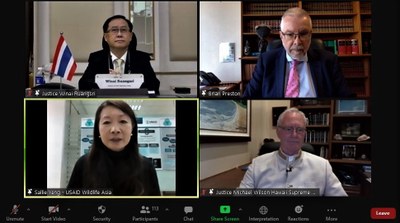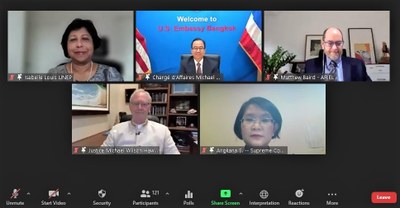United States Boosts Thailand’s Ability to Fight Wildlife Crimes
Thailand is currently drafting its own rules of procedure for environmental cases, which will now be informed by international best practices and other countries’ experiences following the Judicial Symposium. The event promoted Thailand’s regional judicial leadership in ASEAN and advanced Thailand’s own environment courts agenda.
"The United States government remains fully committed to its partnership with regional and national leadership across ASEAN to deter wildlife crime, conserve biodiversity, and uphold the rule of law for the regional stability that underpins a free and open Indo-Pacific. We are honored to work with the Royal Thai Government, and the Supreme Court of Thailand, to improve legal frameworks, to share among nations legal innovations and good practices, and to harmonize the penalties for wildlife crimes across all countries of the region," said Michael Heath, Chargé d'Affaires of the U.S. Embassy in Thailand.
USAID Wildlife Asia, the Office of the President of the Supreme Court (OPSC), the Supreme Court of Thailand (SCT), and the UN Environment Programme (UNEP), with assistance from Asian Research Institute for Environmental Law, organized the Symposium. At the event, the Supreme Court of Thailand and counterparts from the U.S., Australia, China, India, Indonesia, Malaysia, Pakistan, the Philippines and the larger judicial community in the region discussed best practices in environmental courts and adjudication, including handling environment crimes such as illegal wildlife trafficking. 
This is the culmination of a two-year cooperative effort between USAID Wildlife Asia, the Supreme Court of Thailand, and other partners like UNEP to support the Thai Judiciary in advancing their own environment courts initiative. The cooperative effort includes raising awareness and providing targeted continuing legal education at several levels such as the development of the Introductory Course on International and National Environmental Law and Governance in Thailand, which provides the foundations of environmental law and environmental crimes, ensuring that wildlife crime is recognized as an integral part of environmental crime.
“We are confronted by a triple planetary crisis of climate change, biodiversity loss and pollution. More than ever, the judiciary must be innovative and bold when handling environmental cases. Judges should endeavor to promote environmental rights with their decisions to help address this triple crisis and ensure a sustainable future for the people they serve.” said Isabelle Louis, UNEP’s Deputy Regional Director for Asia and the Pacific.
The U.S. Embassy has several agencies working to help Thailand and other countries in the region fight wildlife trafficking. The USAID Wildlife Asia Program is just one of the many U.S.-sponsored efforts to deter wildlife crime, protect endangered species from extinction, and reduce the demand for illegal wildlife products.
Symposium presenters and panelists included representatives from the Thai Supreme Court and Court of Appeal, Land and Environment Court of New South Wales, Australia, the Supreme Court of Hawai’i, Supreme Court of India, Supreme People’s Court of China, Supreme Court of Pakistan, U.S. Department of Justice, and justices and environmental law experts from the Asia Pacific region.


